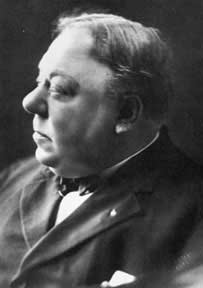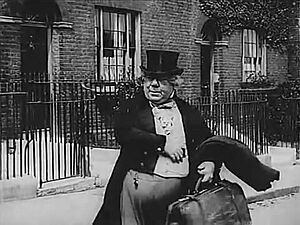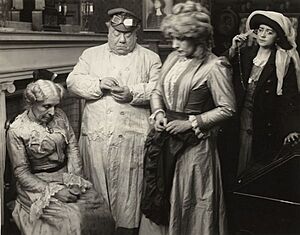John Bunny facts for kids
Quick facts for kids
John Bunny
|
|
|---|---|
 |
|
| Born | September 21, 1863 New York, New York, U.S.
|
| Died | April 26, 1915 (aged 51) New York, New York, U.S.
|
| Occupation | Actor |
| Spouse(s) |
Clara Scanlan
(m. 1890) |
| Relatives | George Bunny (brother) |
John Bunny (September 21, 1863 – April 26, 1915) was an American actor. Bunny began his career as a stage actor, but transitioned to a film career after joining Vitagraph Studios around 1910. At Vitagraph, Bunny made over 150 short films – many of them domestic comedies with the comedian Flora Finch – and became one of the most well-known actors of his era.
Life and career
Bunny was born in Brooklyn, New York and educated in New York public schools. The son of an English father and an Irish mother, he initially worked as a clerk in a general store before joining a small minstrel show at the age of twenty. In a stage career spanning twenty-five years, Bunny worked for a number of touring and stock theater companies, with stints in Portland, Seattle, and various cities on the east coast. Bunny eventually worked his way into Broadway, where he was in productions such as Aunt Hannah (1900), Easy Dawson (1905), and the Astor Theatre's inaugural production of A Midsummer Night's Dream (1906), where his performance as Bottom garnered acclaim.
In a 1915 interview, Bunny recounted how he decided to enter the film industry after determining that "it was the 'movies' that were the main cause of the lean times on stage." Bunny offered his services to Vitagraph Studios, but was refused a job because the studio manager believed he could not offer Bunny a high enough salary. Bunny, however, insisted on taking the lower pay and began working at Vitagraph Studios around 1910, where he went on to star in over 150 films. At Vitagraph, Bunny was often paired with the comedian Flora Finch, with whom he made many popular comedies – often featuring situational humor in a domestic setting, in contrast with the rowdier slapstick style used in some films at the time – that came to be known as "Bunnygraphs" or "Bunnyfinches". According to the Library of Congress, the Bunnygraph genre was exemplified by A Cure for Pokeritis (1912), which features the efforts of a wife to put a stop to her husband's gambling habit by organizing a fake police raid on his weekly poker game.
Regarding a career as a film actor, Bunny said:
There's nothing like it. No other work gives an actor or would-be actor the same advantages. In the pictures, a player gets fifty-two weeks in the year. Where is the theatrical manager who can offer that? Not even vaudeville stars can get such bookings. At best, thirty weeks is about all an actor can expect on the stage. He may get summer stock work, but even so it is of uncertain duration. Stage work is a gamble. Even when you have been engaged for a production, rehearsed from three to six weeks without pay, and no doubt bought your own costumes for the piece, you have no guarantee that it will be a success. If the public does not set its stamp of approval, your job is all over perhaps after but one performance, and you can only repeat the procedure by trying again with someone else, charging the other to your loss account, with a credit notation probably on the page marked 'experience.'
Bunny had been acting in films for only five years when he died from Bright's disease at his home in Brooklyn on April 26, 1915. He was survived by his wife and two sons and interred in the Cemetery of the Evergreens in Brooklyn, New York.
Selected filmography
| Year | Film | Role | Notes |
|---|---|---|---|
| 1909 | Cohen's Dream | Cohen | Alternative title: Cohen's Dream of Coney Island |
| Cohen at Coney Island | Cohen | ||
| 1910 | Davy Jones and Captain Bragg | Captain Bragg | |
| Captain Barnacle's Chaperone | Captain Barnacle | ||
| 1911 | A Queen for a Day | Bridget McSweeney | |
| Teaching McFadden to Waltz | McFadden | ||
| Her Crowning Glory | Mortimer | ||
| Little Nemo | Partially animated short created by Winsor McCay | ||
| His Sister's Children | |||
| 1912 | Captain Jenks' Dilemma | Captain Jenks | |
| A Cure for Pokeritis | George Brown | ||
| Michael McShane, Matchmaker | Michael McShane | ||
| 1913 | Seeing Double | Binks | |
| Flaming Hearts | Jonathan Whippletree | ||
| The Pickwick Papers | Mr Pickwick | ||
| Bunny Dips Into Society | Bunny | ||
| Bunny as a Reporter | Bunny | ||
| 1914 | Love's Old Dream | Professor Simon Sweet | |
| Setting the Style | Mr. Finnegan | ||
| Hearts and Diamonds | Widower Tupper | ||
| 1915 | The Jarrs Visit Arcadia |
See also
 In Spanish: John Bunny para niños
In Spanish: John Bunny para niños



